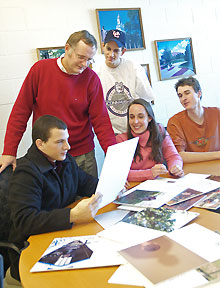Teaching Fellow Encourages Creativity,
Self-Confidence In Class
 |
|
Del Siegle, associate professor of educational psychology, meets with first-year honors students, from left, Eric Veilleux, Jacqueline Bangert, Benjamin Ports, and Neil Bajorin, to look at photos they took for a class on creativity and digital photography. |
|
Photo by Melissa Arbo
|
“What are you scared to do?” “Why are you scared to do it?” These are questions Professor Del Siegle asked his students on the second day of his class on creativity. Although that day’s topic – “societal creativity detriments” – might have sounded dry, he engaged his students by encouraging them to share their personal experiences.
Siegle, an associate professor of educational psychology, prefers not to lecture, and he does not want his students to work alone. He wants them to feed off each other’s ideas because, he says, the creative process works better when concepts are verbalized.
Siegle bases his teaching on three principles: He wants his students to leave the world better than they found it; he wants them to be the best they can be every day; and he wants them to pass on what they have learned to others.
Last spring, UConn recognized Siegle as an outstanding educator by naming him one of two 2004-2005 University Teaching Fellows, the institution’s highest award for teaching. Teaching Fellows offer training and consultation to other faculty, and give presentations on teaching topics during the year.
Siegle started teaching by default. He aspired to be a professional photographer, but had an eye disease that prevented him from realizing that dream: he was going blind. But while working as a photojournalist, he had covered many school events and enjoyed the school atmosphere. When he could no longer see well enough to continue in photography, he became a substitute teacher to pay the bills.
At the age of 26, he went back to school to earn a teaching certificate.
Although Siegle did not receive remarkable grades in high school, as an undergraduate at Montana State University-Billings he set himself a goal of making sure he understood every concept he came across. As a result, he was able to maintain a 4.0 grade point average.
“That little decision to understand the world about me made all the difference,” he says.
Because of his excellent grades, the school systems he worked for felt he was qualified to teach gifted children. He began attending seminars on teaching the gifted, and eventually had enough credits to earn a master’s degree in education. He taught elementary school for eight years.
“I had always taught very bright people,” he says. “They were little people, but they liked to learn in conceptual ways.”
Siegle earned his Ph.D. from UConn, then taught at Boise State University in Idaho for four years before returning to Connecticut. He also had corneal transplant surgery to improve his eyesight. He joined the UConn faculty in 1999.
Siegle says his elementary teaching experience helped him hone his college teaching techniques.
This semester, he is teaching two 300-level courses in educational psychology: Creativity, and Principles of Educational Research.
For Siegle’s class on creativity, his students’ first homework assignment was to transform a can into something different. Some students put their can to practical use, creating a wind chime, for example, a watering can, and a candleholder; others created a piece of art – such as a representation of a frog, a sun, and an airplane.
Siegle says that even at the graduate level, he finds he needs to encourage students to be more confident.
“People are scared of sharing because they think their idea is not going to be good enough,” he says.
He says there are many ways faculty can improve their students’ self-confidence.
Many beginning teachers have certain preconceived ideas about what a teacher should say and do, he says. He believes he became successful as an educator only after letting that image go.
Many professors choose to lecture during the first few years of a course because they are not sure of the material’s content, he says. But once they are more familiar with the content, they can get more creative in their presentation.
Learning is an interactive process, he says. It is a teacher’s job to find ways to connect with the class.
“Try to listen to what you are saying,” he advises. “Process your own words as if you were a student. If something does not make sense to you, it will not make sense to them.”
It also helps to make clear to students why they are learning certain subjects, and what they will be able to do with that knowledge, Siegle says.
“Students are used to being talked at,” he says. “They are not used to being engaged in the learning process.”
He tries to make his lectures seem spontaneous, but actually spends hours carefully planning each class.
“You need to provide variety,” he says. “We all like surprises.”
Graduate student Rosemarie Traceski says Siegle uses ordinary everyday events from his own life to illustrate the points he is making in class.
“He is fun and lighthearted,” she says, “and he tries to make his classes feel that way too.”

